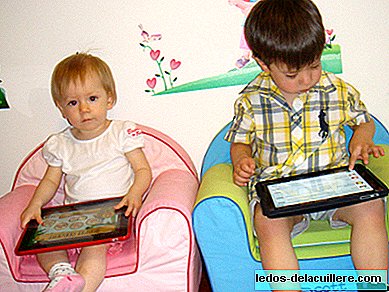In a world where everything comes through a touch screen, in which children increasingly receive stronger and stronger stimuli, how do we get them to be attracted to something as simple as a simple book can be. It has no lights, there are no sounds (well, in most) and as if that were not enough, the drawings do not change!
However, we are all very clear that reading is basic for the development of our children and the set of infinite worlds to which a book is able to transport us, so, here I leave you 13 tips to try to arouse your children's curiosity about books.
Keep in mind that each age requires different stimuli and that it is not the same to read a baby or stimulate his curiosity towards those strange objects that taste like cellulose than a six-year-old boy little given to keep still or a pre-adolescent surrounded by consoles and mobiles. Therefore it will be necessary to adapt to their needs.
Create a suitable environment for reading
We all like to read in a certain way, some in complete silence, in solitude, on our favorite sofa, in bed, in the subway, in the bathroom (something you don't discover until you're a mother or father). Let's start by creating an environment where we all feel comfortable reading, in bed with our children, before going to bed, or in a corner surrounded by their favorite dolls or letting them choose their corner and their positions (time will come in which our body does not let us read face down or with hardly any light)
The sooner the better

We will ensure that the habit of reading - like other types of habits - becomes everyday, as soon as we start working on it. It will be much easier for a 10 year old child to enjoy reading and do it regularly if he has been reading what fell into his hands since childhood.
We cannot pretend that our son starts reading books if the only ones he has seen so far have been class.
Don't be afraid of the theater
Babies like the characters come alive, if you read a story linearly, without changes in expression and just thinking when it is going to end, it is very likely that they have found a way so that your child does not like reading.
Enjoy reading you first so they can enjoy it with you. Voice the characters, imitate their gestures, even smells, you will see how everything changes and your children will be willing to read a story.
Help yourself with accessories
Accessories? If the mind doesn't need any of that! And to a certain extent it is true, our mind is capable of creating everything that history needs to make us get into it. The problem is that babies need certain links with reality so that the story comes into their head. So helping with stuffed animals or toys will help us explain the story to the little ones. It is clear that with the elderly, this paraphernalia is becoming less important.
Rhymes
Rhymes are a simple way to memorize things and to learn words and with them stories. Recall that the first books have been the stories that were told orally for those who could not read or write and were made in the form of songs and verses to facilitate their learning.
What will happen next?

Create a suspenseful environment, encourage your curiosity. This is very easy in young children, because wanting to know is something innate. We can pause reading type: "Go on, the boy has found a frog ... what will he do with it now?" It is a good way to keep them attentive to the thread of the story, not to be distracted and to create their own stories in the head.
Play with curiosity
Look, there is a wolf that goes to a farm ... what will the book be about? Do you want us to read it to know what the wolf is going to do? In this way you give a choice apart from putting the focus of your curiosity on something new. With older people we can take advantage of something that has happened in real life, somewhere we have gone to see or go, or a holiday or movie so that we encourage them to want to know more by reading a book at home or looking for information by Internet.
Create your own story.

We don't need to finish the stories as the book indicates, it is possible that sometimes we prefer to change the end or some feature of some of the characters to adapt the story to our children, change male characters to female, some animal for their favorite animal, eliminate some scene that scares them, etc.
For older people we can also take advantage of books that have an open plot and ending, in which the reader himself is the one who chooses how he wants the story to continue making decisions for the protagonist.
Understand the moral and know the emotions
Most children's books have a final moral and many are used to make them realize the emotions of real life or the consequences that certain actions can bring. "Look, the baby is crying because he has lost a toy. Do you get sad when you lose one of your toys?", "Look, the child feels bad because others laugh at him" And so, little by little, We can teach our children to express what they feel or that our actions have consequences for others.
No matter what you read, the case is to read
Reading García Márquez, Cervantes or any of the great classics of literature is very good and is something that every school should encourage. The problem is that not everyone likes the same readings and Forcing a child who doesn't like reading too much to read something he doesn't like is the best way to get him to hate reading forever. Letting children read what they want is the best way to encourage pleasure in reading, no matter if it's War and Peace, Don Quixote or a Comic Book, the important thing is to read. An assiduous reader ends up being curious about different stories and sooner or later he will reach the greats of literature, just let him mature.
Be your example

It is clear that the best way for a child to be attracted to reading is to see us reading, Even if it's the shampoo label! and above all that he sees us reading books, of paper ones, because that way we will avoid the temptations of confusing it with tablet games.
Let them read the stories to others
Once our children know how to read, we can take advantage so that be they who read a story to usThis will reinforce their reading comprehension, their ability to read and their self-esteem, since they are now the ones who read to whom they read so much as children. Also that they be the read to your little siblings or even your pets It can be of great help.
Love books
Reading is also encouraged by respecting books, taking care of them while we read them, being careful not to lose them, painting them or using them as ammunition for the new catapult.
Photos | iStockphoto
In Babies and More | Born to read: promote reading from the first month of life, Readings to grow, an interesting selection of children's books












